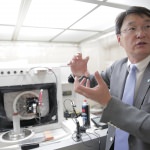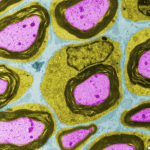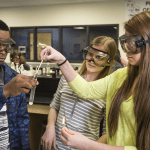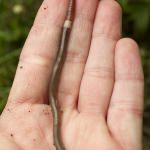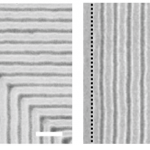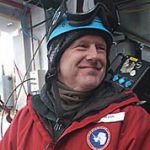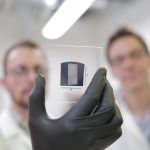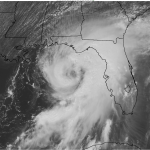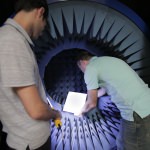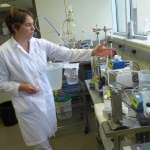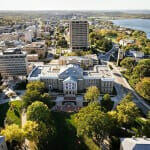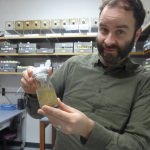Category Science & Technology
Advanced nano-cutter boosts emerging materials research at UW–Madison
The unique machine, the first of its kind in North America, is capable of milling in three dimensions with nanometer precision.
UW-Madison wins two first-ever ‘NSF INCLUDES’ awards
Two projects of the Wisconsin Center for Education Research within UW–Madison’s School of Education are among those selected to receive first-ever National Science Foundation INCLUDES funding. The projects hope to develop bold new approaches for diversifying the science and engineering workforce of the United States.
GE visits campus to honor student contest winner, talk innovation
It’s hard to take Chris Nguyen seriously when he says, “I’m just a regular guy.” After all, he drew leaders from international industrial giant GE to the University of Wisconsin–Madison campus Monday bearing awards and scholarship money.
Voracious Asian jumping worms strip forest floor and flood soil with nutrients
Asian jumping worms, an invasive species first found in Wisconsin in 2013, may do their work too well, speeding up the exit of nutrients from the soil before plants can process them.
Vaccine trial aims to make flu season safer for heart patients
A network of researchers in the United States and Canada will try to spare thousands of patients the dangers of heart attacks and hospitalizations over the next five years in a trial of a high-dose flu vaccine.
New computer chip manufacturing method squeezes more onto limited wafer space
Computer chip makers continuously strive to pack more transistors in less space, yet as the size of those transistors approaches the atomic scale, there are physical limits on how small they are able to make the patterns for the circuitry.
Paulos named director of Physical Sciences Laboratory
Whether you need a more rugged boat-mounted water testing rig made, or a 20-year-old spectrometer or circuit board upgraded, the Physical Sciences Lab delivers with expertise and teamwork.
Thrive or fail: Examining forest resilience in the face of fires
“It’s not only western forests where these things matter, where disturbances and changing environments shape regional landscapes,” says Wisconsin researcher Monica Turner.
For first time, carbon nanotube transistors outperform silicon
For decades, scientists have tried to harness the unique properties of carbon nanotubes to create high-performance electronics that are faster or consume less power. Now, for the first time, University of Wisconsin–Madison materials engineers have created carbon nanotube transistors that outperform state-of-the-art silicon transistors.
UW-Madison scientists help fly Global Hawk drone into Hermine, other hurricanes
The Global Hawk is part of a three-year experimental mission called SHOUT (Sensing Hazards with Operational Unmanned Technology), focused on studying whether the drone can improve hurricane analysis and forecasting in an economically feasible way.
Chemistry method expedites path to useful molecules for medicine
The new method gives chemists prospecting for bioactive molecules a new tool in the search for novel drugs or chemicals for agriculture.
Standing still may help improve antennas that scan in all directions
Spinning large objects nonstop takes a lot of time and mechanical energy. So scanning from a stationary position could speed up long-range detection and communications.
A visual nudge can disrupt recall of what things look like
The connection between visual knowledge and visual perception challenges widely held theories that visual information about the world is stored abstractly.
Symmetry crucial for building key biomaterial collagen in the lab
Functional human collagen has been impossible to create in the lab. Now, a team of University of Wisconsin–Madison researchers describe what may be the key to growing functional, natural collagen fibers outside of the body: symmetry.
Biological supplier prospers with aid of UW manufacturing expertise
A Madison lab is using the university's quick response manufacturing techniques to bring products to market more quickly and improve profits.
Biophysicist, chemical engineer named Steenbock Professors
Paul G. Ahlquist, who explores virus replication, and James B. Rawlings, who develops methods to model chemical processes, are the 2016 recipients.
A better way to predict the weather on sea and over land
Scientists at UW–Madison have made new updates to old technology that will enable weather forecasters to make improved predictions of severe weather.
Fruit flies help explain differences between males and females
John Pool, assistant professor of genetics at UW–Madison, studies evolutionary genetics in his “fly room.” David Tenenbaum Vive la difference! Trust the French…

